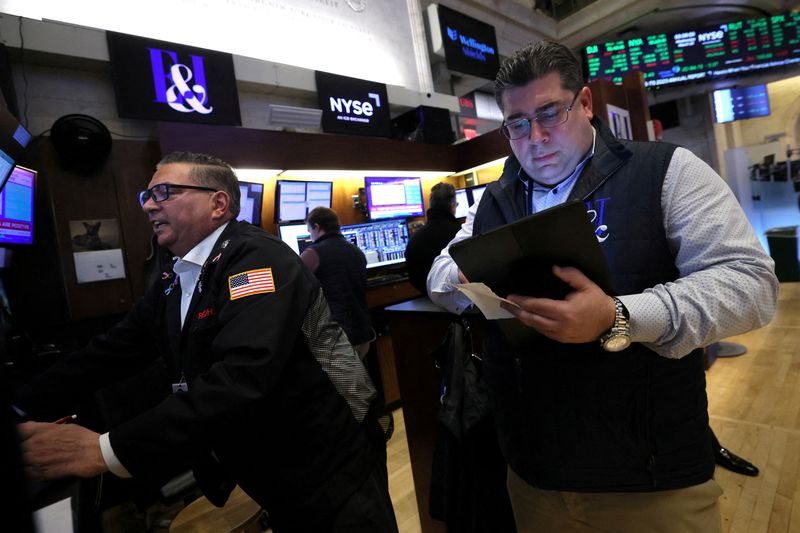By David Randall
NEW YORK (Reuters) -After a stellar start to the year for stocks, investors are on guard for potential bumps in the second quarter as they gauge whether the Federal Reserve delivers on an expected interest rate cut by June and turn their focus on the health of upcoming earnings.
The S&P 500 ended the first quarter with a gain of more than 10%, its largest first quarter advance since the nearly 13.1% jump in the first quarter of 2019. While so-called Magnificent Seven stocks such as chipmaker Nvidia (NASDAQ:NVDA) and Facebook parent Meta Platforms (NASDAQ:META) provided the bulk of the gains for the quarter, economically-sensitive sectors such as energy and industrials have rallied over the past six weeks.
Whether the rally continues through June will likely depend on the Fed, which has not yet signaled that inflation has come down enough to justify a rate cut. Markets began January with 6 to 7 cuts priced in over the course of 2024, but are now anticipating 3 cuts after signs of resiliency in the US economy increased investor confidence in a so-called soft landing.
"The market and the Fed are finally aligned on expectations, but that puts even more pressure on every economic report that comes out because it doesn't take a lot to make everyone run the same way," said Joe Kalish, Chief Global Macro Strategist at Ned Davis Research. "We are expecting more volatility if we don't see more progress on the inflation front."
Futures markets are now implying a 61% chance of a 25 basis point cut rate at the Fed's policy meeting that concludes June 12, bringing benchmark rates to a range of 5 to 5.25%, according to CME's FedWatch Tool.
Continued growth in the US economy will likely continue the recent broadening of the market rally into cyclical sectors and small-cap stocks as investors search for more attractive valuations, said Jason Alonzo, a portfolio manager on Harbor Capital’s multi-asset strategies team. The Russell 2000 index of small-cap stocks ended the first quarter with a 4.8% gain, while the S&P 500 industrials sector rose nearly 11% over the same time.
"Right now the only thing the market cares about is whether the Fed remains in control even if the economy re-accelerates," Alonzo said. "If that idea was upset somewhat and the Fed had to imply that rate hikes were back on the table, that would be a shock to investors and cause a real issue for all assets."
Economic readings next week, including ISM manufacturing data, ISM services, and the closely-watched non-farm payrolls report, which economists polled by Reuters expect to show a growth of 198,000 jobs in March.
Investors should not be surprised if the market rally starts to slow as the Fed nears a potential rate cut, noted Sam Stovall, chief investment strategist at CFRA Research. Since 1989, the S&P 500 has gained an average of 15.5% between the last rate hike of a cycle and the first rate cut, but gained an average of just 5.4% in the six months following the first rate cut, he said.
Still, strong momentum in the first quarter has historically carried over to the following quarter, said Keith Lerner, Co-Chief Investment Officer at Truist Advisory Services. Of the 11 times that the S&P 500 has posted a total return of 10% or more in the first quarter, the market continued to advance in the second quarter 9 times, with an average gain of 6.2%, he said.
"The market deserves the benefit of the doubt and at this point we think bull market rules apply," Lerner said. The biggest risk to a continued rally would be a sign that the Fed is considering keeping rates at current levels through the end of the year, which would lead to "dramatic" repricing of risk assets, he said.
The likelihood of a market slowdown will also depend largely on corporate earnings, which came in surprisingly robust and helped push the S&P 500 to a series of record closing highs despite the market repricing interest rate policy, said Emily Roland, Co-Chief Investment Strategist at John Hancock Investment Management.

S&P 500 earnings grew at a 10.1% pace in the last quarter of 2023, more than double the 4.7% expected advance, according to LSEG I/B/E/S. High interest rates will likely weigh on consumer and corporate spending, with analysts expecting a 5.1% earnings growth over the first quarter. Companies begin reporting results in earnest the second week of April.
"If earnings continue to surprise to the upside, the Fed will have a hard time justifying 3 cuts this year," Roland said. "But if we see a leveling out of inflation this economic re-acceleration could turn into something more sustainable."